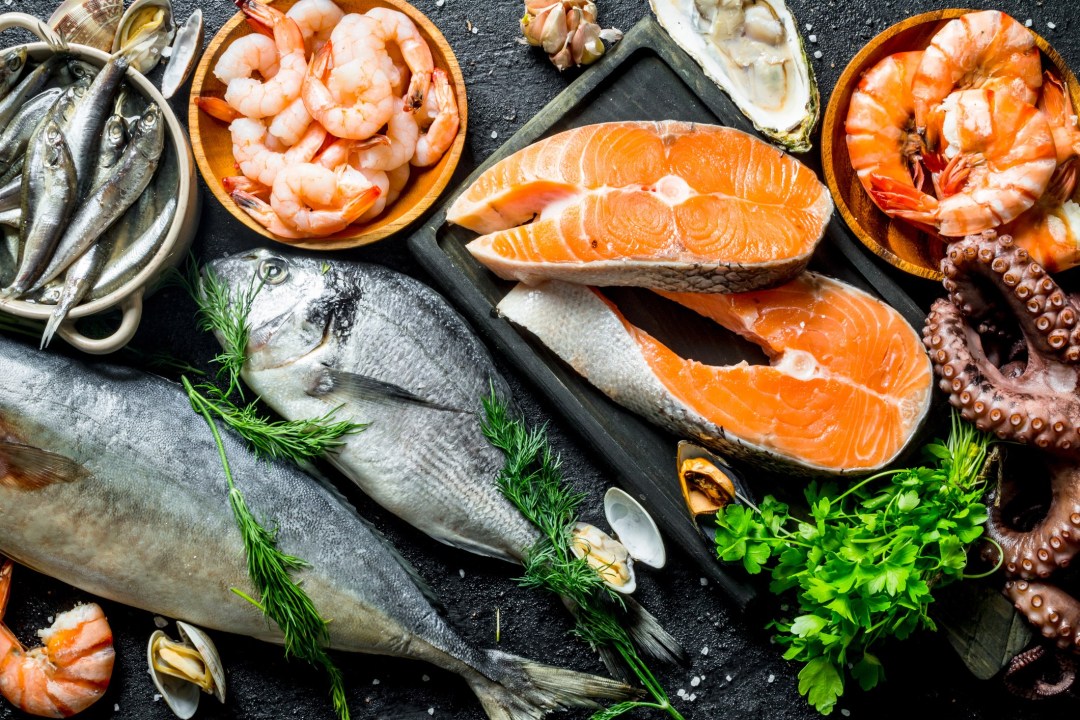As I sit under the sole tree on a Spanish beach, watching my fellow Brits shudder at the writhing horror show contained in the restaurant’s seafood display, it strikes me the middle classes don’t actually much like the dead-eyed edibles under the waves – we’re just conditioned to pretend to because eating them is supposedly chic.
Sure, we extol fish as a sustainable and sophisticated source of high-quality protein, vitamin D and what sounds like K-pop’s next girlband, omega-3. It’s the well-informed, thinking man’s dinner, akin to choosing a Tesla before Elon Musk’s meltdown phase. But let’s be honest: the glassy stare (I’m still talking about the fish), the slimy skin (still fish) and the teeth that could make a dentist cry (fish) do not scream yum.
‘We love seafood in Spain,’ my Spanish friend Pablo says, happily confirming my suspicions with no prompting. ‘But I find it mind-boggling that you guys live on an island and hate it. Japan is the exact opposite.’ Is it a deep-rooted fear of the unknown that we don’t like? Or a deep-rooted yet ultimately warped infantilism that means we prefer eating things with cute faces, after the cute faces have been removed? Or are we simply more squeamish than other nations?
Perhaps the truth lurks somewhere in the depths of our culture: ‘That smells fishy to me,’ a detective might say in a cop show – our mistrust right there in the vernacular. From films all the way back to Twenty Thousand Leagues Under the Sea, when Captain Nemo challenged Ned Land to an underwater bushtucker trial, to Bill Murray’s blowfish in Charlie’s Angels, we instinctively understand that seafood is nothing more than an endurance test – and that, somewhere along the way, it’s morphed into a middle-class pretension, designed to set us apart from the, er, shoal we swim in.
Of course, some people have made entire careers out of our supposed love of fish, transforming towns into one-man industries and providing the BBC with hours of what looks like quite reasonably priced telly. I ask Rick Stein what he thinks. ‘The idea that no one really likes fish has oppressed me since I started cooking,’ he says. ‘But I am conscious of people not sharing my enthusiasm; a builder who worked for me in the early days asked if I cooked real food or just fish.’ For Rick, it was the ‘wonderful oysters and crabs’ of childhood holidays on the Cornish coast that ignited his passion, which was compounded by the catches coming in off the local boats in Padstow. As he points out: ‘The Seafood Restaurant has been open for 50 years this year so one or two other people might disagree with you.’
Fine – but why is it considered classy to like gross things? I remain unconvinced that an oyster is any different, in both taste and consistency, to a sorry day out with the team at Thames Water. Frogs’ legs weren’t eaten out of choice, they were eaten because French monks got bored of Lent. There’s a reason snails are drenched in garlic. Is there an element of Brit grit – a kind of officer-class, stiff-upper-lipness – the middle-class psyche aspires to? A facet of semi-conscious social coding whereby swallowing a repulsive organism sets you apart as a leader, a visionary, maybe even a bit of a sexy masochist? (A truly posh person would simply eat whatever they want, whenever they want it, beaked things for breakfast and tailed for tea, but that’s another story.)
Is there a facet of semi-conscious social coding whereby swallowing a repulsive organism sets you apart as a leader, a visionary, maybe even a bit of a sexy masochist?
Which brings us back to Pablo, who’s warming up to his theme. He reckons ‘the only fish most people will eat in the UK has to be deep-fried or processed beyond recognition’. And the facts support his statement: there are 10,500 chippies in the UK, as according to the National Federation of Fish Friers, whereas SeafoodSource counts just 1,000 fishmongers. It helps explain why the furthest most of us will go in the supermarket is a block of salmon – which retailers instinctively understand must be presented in non-fishy chunks the way Americans cut all meat, to avoid any indication that it used to breathe, and drenched in an Asian-inspired sauce that’s surely the precursor to how our lab-grown slabs will be sold in 2050.
A similarly confused approach is there on the lunchtime high street too: how else to account for the success of Itsu, a chain that twists its offerings into such childish contortions a Japanese tourist could fairly assume it was a kids’ restaurant, or a practical joke in an elaborate gameshow (I once shared a lift with a brain behind Itsu, who didn’t see the funny side).
Perhaps it’s time for us to admit to who we really are, to do away with the knackering middle-class curse that has us constantly striving to stand out from the crowd, and order something that we’ll enjoy eating because it’s tasty and not because we’re supposed to like it. All of which brings me back to that beach in Spain and the honest holidaymaker’s one true meal – the classic Benidorm full English.








Comments